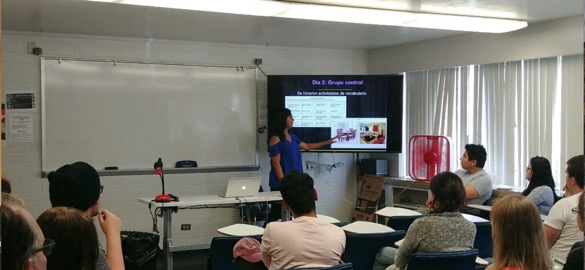By Heidi Toth
NAU Communications
In a few days, Blanca Acosta will put on her cap and gown, arrange her navy blue tassel on the right side of her cap and walk across the stage at the J. Lawrence Walkup Skydome at Northern Arizona University. She will shake hands with President Rita Cheng and Graduate College Dean Maribeth Watwood. She will move her tassel to the left and look up into the audience where her family sits, cheering her on as she becomes the first member of her family to earn a master’s degree.
Acosta, who is graduating with her master’s in teaching Spanish (MATS) degree, is a pioneer. She was also the first in her family to graduate from college, and, although she followed in the footsteps of her older brother in finishing high school, they didn’t come from a legacy of education.
“Being the first in my family to graduate from college motivated me to become the best version of myself professionally and personally,” Acosta said. “It motivated me to set an example for my younger siblings and show them that success can be achieved with dedication.”
Acosta, who recently received the Outstanding Graduate Teaching Assistant Award, taught Spanish for four semesters, including the planning and implementation of lessons related to the language and culture as well as daily assessments of student learning. She incorporated her thesis research into her classroom, studying the effectiveness of task-based language teaching (TLBT) principles on the acquisition of vocabulary.
“I wanted to investigate this because I believe that relating language learning to real life is a vital part of the acquisition process, and this is what TBLT does,” she said. “It was very interesting to see my students engaged with the activities I had prepared that incorporated this approach in my classroom.”
She found this method of learning does help students learn vocabulary, particularly when those words are learned in context. This, along with other research coming out on how to effectively teach second languages, is one of the many factors that combined to make Acosta a good teacher, said Karina Collentine, associate professor of Spanish linguistics.
“Blanca’s experiences have shaped her into the individual that she is today—an individual who continues to work toward a specific goal: to serve as a role model and mentor for young people, so others do not need to be their own mentors, as she was, and share with them her passion for learning and for the Spanish language, culture and literature,” Collentine wrote in a letter nominating Acosta for the GTA award.
Acosta is so effective in the classroom, Collentine said, that other graduate teaching assistants observe her teaching to learn ways to present new materials, keep students engaged and focused on communication and adapting her own speech to the linguistic needs of the students, which can be a challenging task for a teacher teaching her own native language as a second language. She is dynamic in the classroom, Collentine added, but also helpful, approachable and cheerful outside the classroom.
“Someone else faced with as many challenges as she has faced would not smile so easily, be the first to offer to go the extra mile or take a moment to share an idea or contribute to an academic conversation,” Collinetine said. “Students arrived early to her class, linger afterward to chat or ask about something or stop in during her office hours. Blanca sees her role as a teacher going beyond the classroom.”
Acosta, who said her favorite part of her time at NAU was seeing her students advance in their Spanish abilities, attributed her success in part to support from friends, family and her fiancé. After graduation, she plans to return to San Luis and continue teaching.
“I am so excited to continue being a part of students’ growth and being part of their academic development,” she said.



